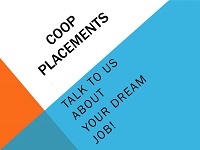Co-operative Education (or Co-op) is a form of experiential learning. Experiential learning is a chance to apply your knowledge and skills through hands-on experiences. These opportunities build valuable knowledge, essential skills, work habits, technical literacy and networks in business, industry and the community.
Co-op is a ministry-approved program that allows students to earn secondary school credits while completing a work placement. The program consists of a co-op course monitored by a teacher, a related curriculum course in any subject and a work placement.
Why take Co-op?
- Gain experience in a field of your choice.
- Make connections and obtain references.
- Develop your resume.
- Make informed decisions about your post-secondary pathway.
How does it work?
Earn 2 or 4 credits (afternoon or full day) which count as 2 of your compulsory courses and/or any of your optional credits.
Who is it For?
Co-op programs are for secondary students who are heading for university, college, apprenticeship, or the workplace.

University Pathway
- Include cooperative education in your Personal Profile and Statement of Experience.
- Make informed choices and save money selecting suitable possible courses and programs.
College Pathway
- Gain experience in the field of your choice that will assist in your studies at college.
Apprenticeship Pathway (OYAP)
- Register in one of the 130+ apprenticeship programs.
- Start your apprenticeship while still in high school and gain apprenticeship hours.
- Make industry contacts and gain references.
- Some apprenticeship programs are linked directly to a college program.
Workplace Pathway
- Gain work experience
- Make contacts in your chosen field and gain industry references.
- Make potential contacts that could lead to future employment opportunities.
- Save a potential employer valuable time and money as you have already gained the training necessary to do the job.